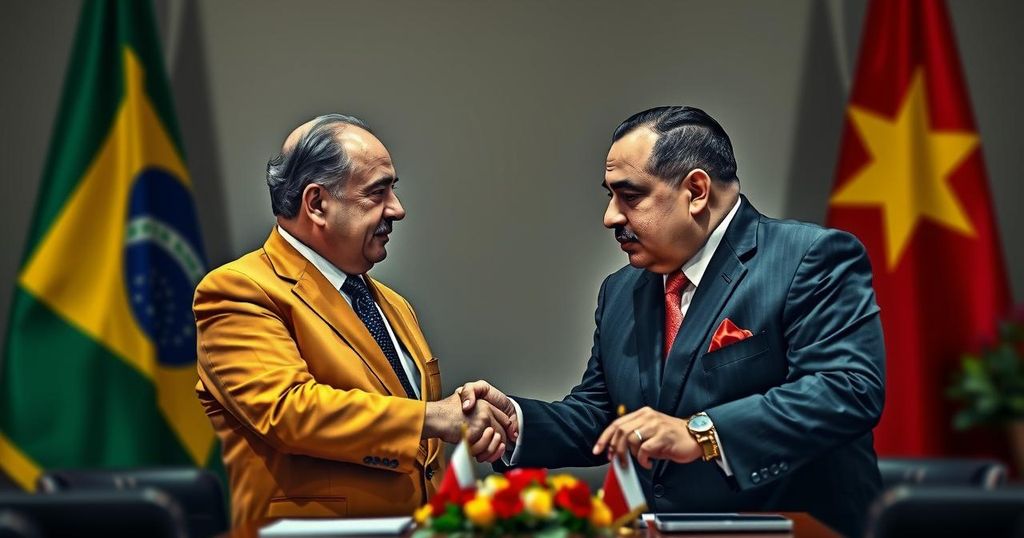China’s Xi Jinping Visits Brazil to Strengthen Bilateral Relations

President Xi Jinping’s upcoming visit to Brazil aims to strengthen ties with President Luiz Inacio Lula da Silva amidst global uncertainty and the potential return of Donald Trump. The meeting will focus on enhancing economic cooperation, addressing trade imbalances, and discussing their respective roles within the Global South. Both nations seek to leverage their relationship as a counterbalance to U.S. influence while celebrating 50 years of diplomatic relations.
On Wednesday, President Xi Jinping of China will begin a state visit to Brazil, following his participation in the G20 and APEC summits where he received a warm welcome. This visit holds significance as Xi aims to “further enhance” bilateral relations with Brazilian President Luiz Inacio Lula da Silva, who served as the host for the recently concluded G20 summit in Rio de Janeiro. With the impending return of Donald Trump to the White House, China is contemplating the future dynamics of its relationship with the United States, especially after the constructive ties established with Joe Biden’s administration. Both China and Brazil have positioned themselves as prominent advocates of the Global South amidst global unrest characterized by ongoing conflicts in Ukraine and the Middle East. Ahead of his visit, Xi emphasized this collective ascent, stating, “The Global South is on a collective rise,” in a piece published in Brazilian media. In their partnership, the two nations aim to address various international and regional issues, while seeking to enhance economic collaboration. China remains Brazil’s largest trading partner, with bilateral trade exceeding $160 billion in the previous year. The discussions between Xi and Lula are expected to address the promotion of synergy between their respective development strategies. Brazil aims to increase its export of value-added products, moving beyond its traditional export of primary commodities like soybeans. Lula’s administration is attempting to balance its foreign relations, enhancing ties with both Beijing and Washington. A recent visit by Brazilian Vice President Geraldo Alckmin to China was interpreted as a potential step towards Brazil joining the Belt and Road Initiative, a critical element of Xi’s strategy for increasing China’s international influence. The engagement of South American nations in this initiative raises concerns among U.S. officials about the implications of growing Chinese investments in the region. This upcoming diplomatic meeting marks the celebration of 50 years of robust relations between Brazil and China, during which Lula is anticipated to discuss how to recalibrate their economic ties to benefit Brazilian firms more effectively. As the influence of the U.S. potentially wanes in Latin America and globally under Trump, Brazil aims to establish itself as a more prominent player on the international stage. It will be imperative for China to honor its commitment to assist in Brazil’s industrialization to mitigate ongoing trade imbalances.
The ongoing state visit of Xi Jinping to Brazil is framed within the broader context of shifting global power dynamics, particularly with the looming presence of former President Donald Trump, whose return to office is expected to alter U.S.-China relations. China and Brazil’s efforts to fortify ties reflect their ambition to emerge as leaders of the Global South amid significant global challenges. The anniversary of their diplomatic relationship serves as a backdrop to their discussions on increasing economic collaboration and resolving trade imbalances.
In conclusion, President Xi Jinping’s visit to Brazil highlights the importance of enhancing Sino-Brazilian relations amid a changing geopolitical landscape. With both nations celebrating 50 years of diplomatic ties, their discussions will focus on promoting economic cooperation and addressing challenges posed by shifting global power dynamics. The outcomes of this meeting could have lasting implications for their respective roles in the Global South and their responses to a potentially confrontational U.S. administration under Trump.
Original Source: www.voanews.com








